Software engineer vs. developer: which one should you choose? It's a critical decision that can make or break your project. While both are crucial for any software project, choosing the wrong one can lead to disastrous results. The difficulty lies in understanding the specific requirements of the project and the necessary skill sets required to complete it.
While a software engineer takes a broader perspective which focuses on software architecture, design, and development, a software developer is responsible for writing code for specific software components.
In this article, we'll explore the key differences between these two roles, their specific skills and expertise, and the pros and cons of hiring them. By the time you’re done reading the guide, you’ll not only have a clear understanding of the differences between a software engineer and a developer but you will also be familiar with the types of projects that each role is best suited to handle.
1. What Is A Software Engineer - An In-Depth Analysis
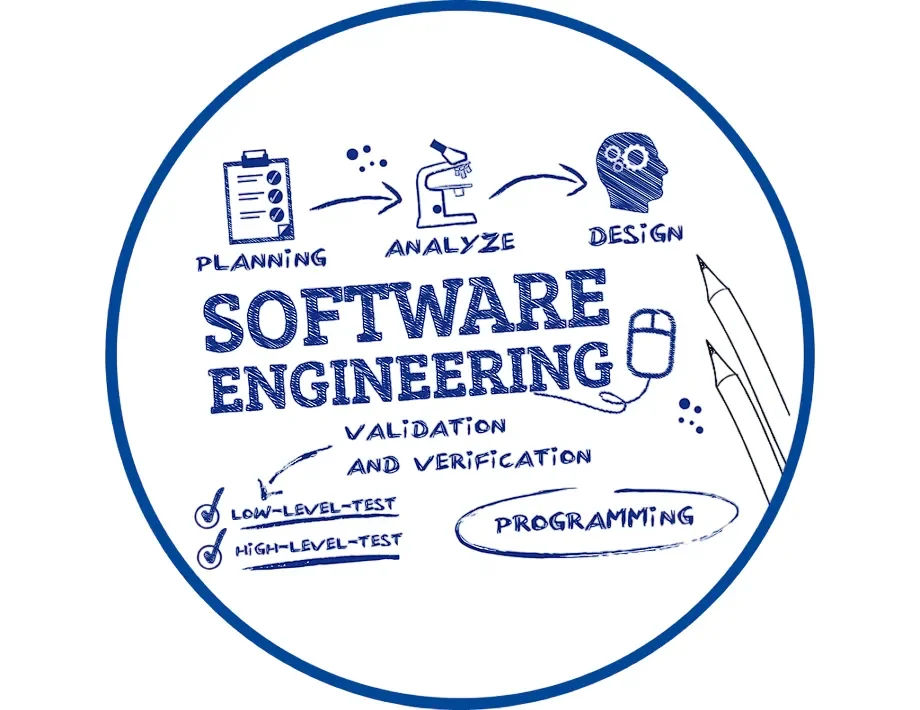
Software engineers are skilled professionals who use engineering principles and programming languages to design, develop, test, and maintain software applications. Their work involves creating software products that range from simple mobile apps to complex enterprise systems.
They also design computer games, develop network control systems, and work on cutting-edge technologies such as artificial intelligence and machine learning.
Software engineers take a systematic approach to software development using scientific and mathematical principles. They think logically and systematically to break down complex problems into smaller, more manageable components and develop solutions that can be implemented in a step-by-step fashion.
There are many different types of software engineers and each has its areas of expertise. Some software engineers specialize in developing mobile apps while others focus on web development, operating systems, or database management. Whatever their area of specialization, all software engineers share a commitment to designing and developing high-quality, reliable software that meets the needs of users.
1.1 Required Educational Qualifications For A Software Engineer
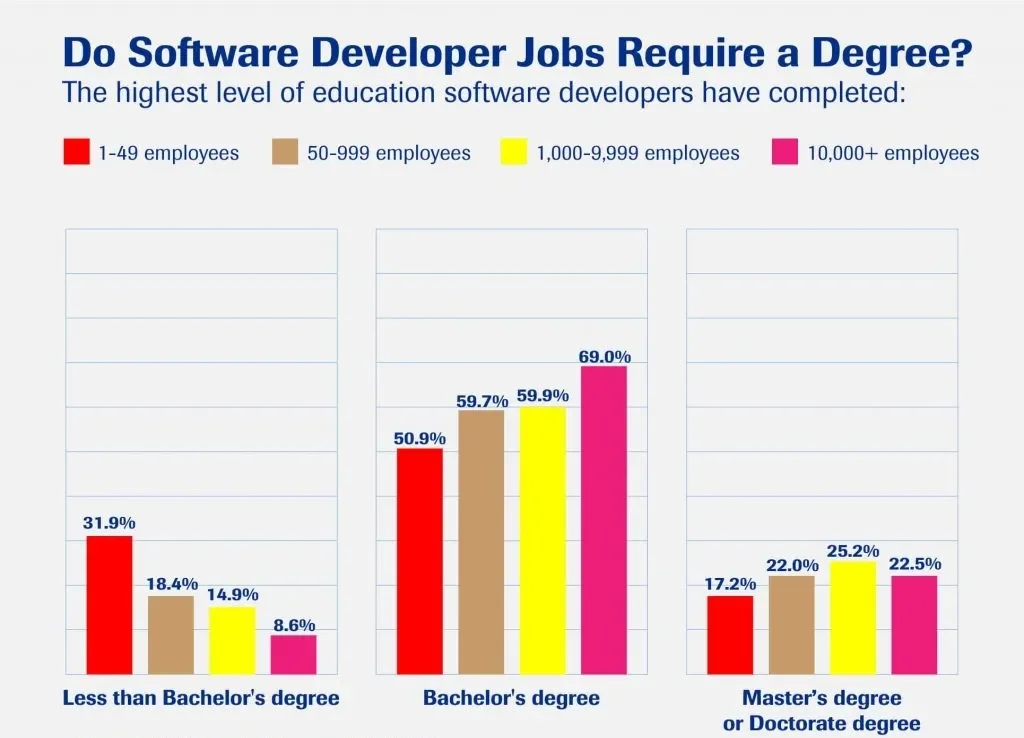
The truth is that there is no universal answer to this question as the requirements can vary depending on the specific job and industry. That being said, a bachelor's degree in computer science, software engineering, or a related field is required for most entry-level software engineering positions.
This degree will provide a solid foundation in computer programming languages, data structures, algorithms, and other key concepts that are essential to the field. Some may require a master's degree in computer engineering or a related field for certain specialized roles, such as artificial intelligence or cybersecurity.
However, while a degree is certainly beneficial, it's not the only way to break into the field of software engineering. Many successful software engineers have gained their skills through self-study and online courses as well as coding boot camps and other non-traditional educational paths.
So, while having a degree in computer science or software engineering is certainly helpful, it's not necessarily a requirement to succeed in this field. The most important thing is to hire a software engineer who continues learning and growing their skills throughout their career, whether through formal education or self-study.
1.2 Required Skills For A Software Engineer
Here are some key skills that you must look for in a software engineer when hiring one:
1.2.1 Understanding Of Software Architecture
A software engineer must have a solid understanding of software architecture and the high-level design of software systems. This includes knowledge of patterns and principles that guide software design, such as the Model-View-Controller (MVC) pattern or the SOLID principles.
1.2.2 Knowledge Of Software Development Methodologies
To work effectively on a software development team, a software engineer should be apt at software development methodologies such as Agile or Waterfall. They should break down work into manageable pieces, prioritize tasks, and track progress.
1.2.3 Familiarity With Version Control Systems
Version control systems, such as Git, are essential tools for software engineers. These systems allow engineers to track changes to code over time, collaborate with other developers, and easily revert changes if needed.
1.2.4 Proficiency In Data Structures And Algorithms
Data structures and algorithms are the building blocks of software development. A software engineer must have a strong understanding of these concepts and be able to apply them to real-world problems.
1.2.5 Familiarity With Databases
Databases are a crucial part of many software applications and a software engineer must know how they work. This includes knowledge of SQL and database design principles. It’s also useful to have a working knowledge of the hardware that underpins databases, even if you’re not directly responsible for overseeing it in your role. This includes knowing the differences between CPU cores and threads, and how this impacts performance.
1.2.6 Knowledge Of DevOps Practices
DevOps is a set of practices that combines software development (Dev) and IT operations (Ops) to enable faster and more reliable software delivery. A software engineer should be familiar with DevOps practices such as continuous integration, continuous delivery, and infrastructure automation.
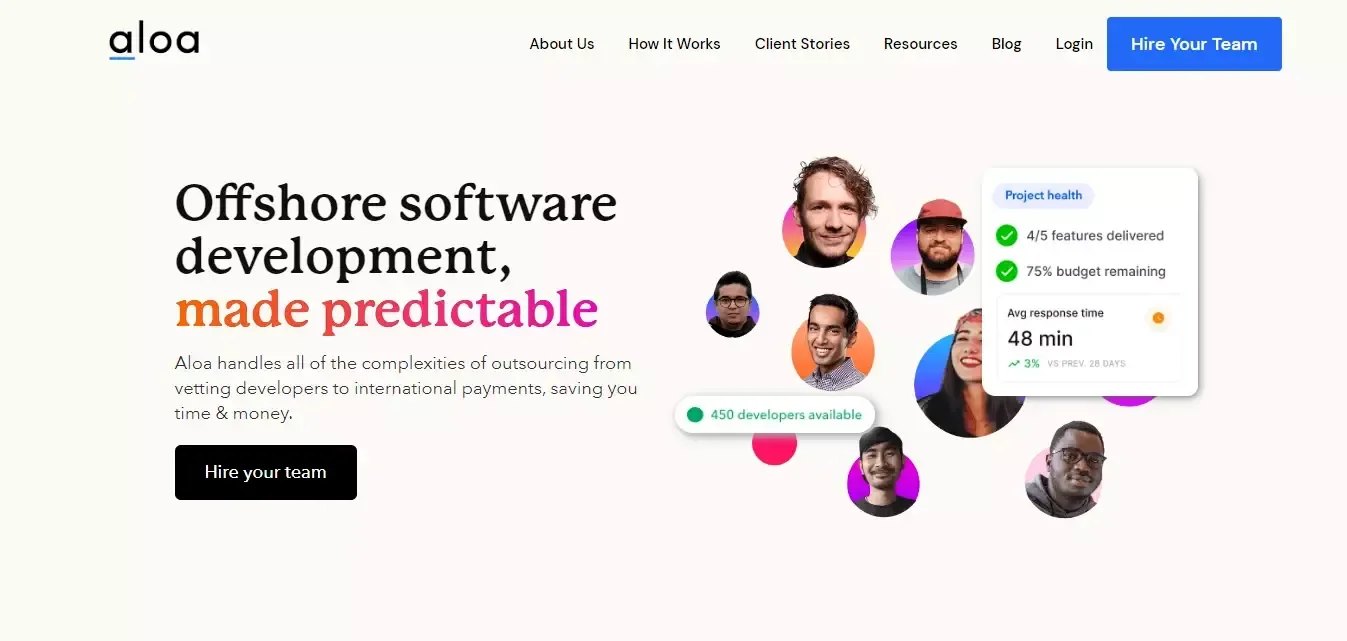
It can be a challenge to find someone with the right mix of technical skills, communication abilities, and teamwork experience. Fortunately, we at Aloa can take away the worries associated with the conventional hiring and recruitment process.
With Aloa, you get access to a pool of talented engineers who have been carefully vetted and selected based on their technical skills and work experience. This saves you time and resources that would otherwise be spent on recruitment and hiring. We also provide ongoing support and resources that ensure the success of your software engineering project.
1.3 Typical Job Roles Of A Software Engineer
Let’s take a look at different job roles specific to software engineering:
1.3.1 Data Scientist
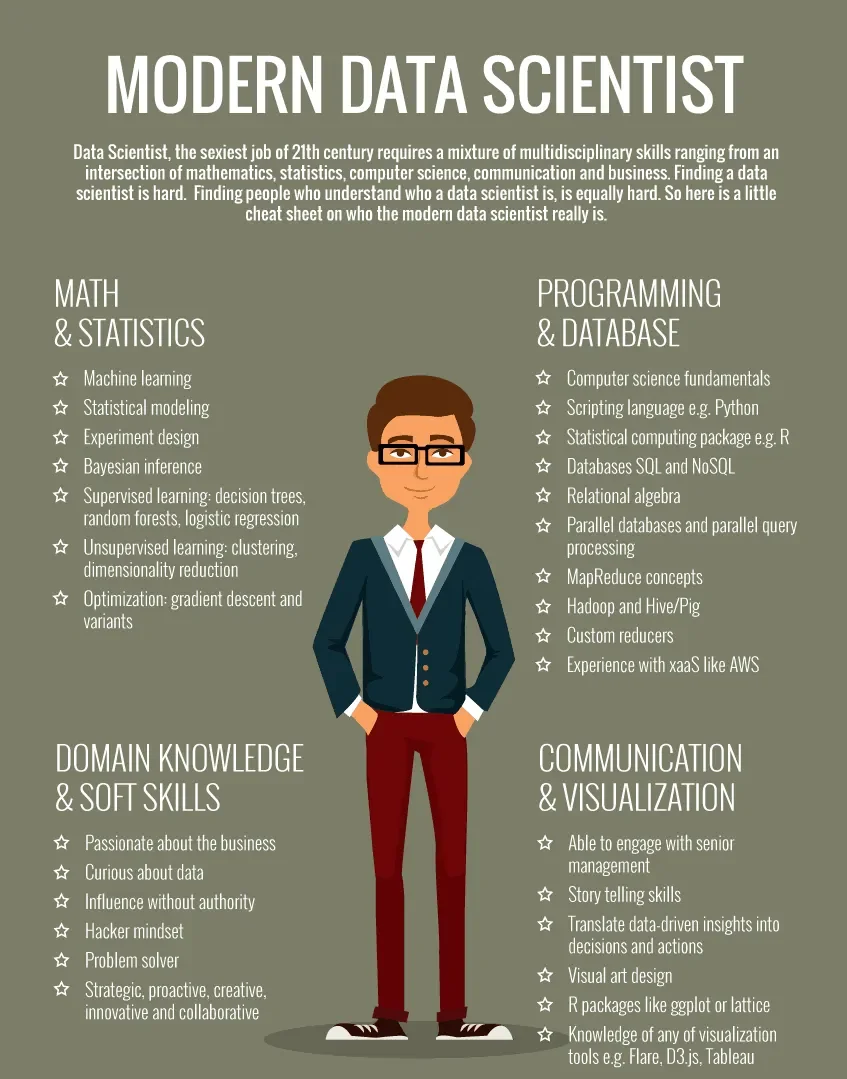
A data scientist is responsible for analyzing and interpreting complex data sets. They should understand statistical analysis and machine learning algorithms. Data scientists are essential in the software development process as they can analyze user behavior and provide insights that can improve the software product.
1.3.2 Cybersecurity Engineer
A cybersecurity engineer ensures the security of a software application. They possess knowledge of cybersecurity threats and vulnerabilities, as well as programming languages and security tools.
1.3.3 Machine Learning Engineer
A machine learning engineer is responsible for developing machine learning models and algorithms. They are skilled in programming languages such as Python or R, as well as machine learning frameworks such as TensorFlow or PyTorch.
1.3.4 Embedded Systems Engineer
Embedded systems engineers design and develop computer programs for embedded systems, such as microcontrollers or microprocessors. These engineers are essential in industries such as automotive, aerospace, and medical devices.
1.3.5 Natural Language Processing (NLP) Engineer
NLP engineers develop software that can understand and process human language. These engineers must be apt at programming languages such as Python, as well as NLP frameworks such as Natural Language Toolkit (NLTK) or spaCy. NLP engineers are in high demand as natural language processing is becoming increasingly important in different industries.
1.4 Projects That Are Best Suited For Software Engineers
Different software projects require the expertise of a software engineer during the entire development process. If your project falls under any of the below-mentioned categories, you're going to need a software engineer to help you out:
- Cybersecurity and encryption tools
- Virtual and augmented reality projects
- Networking and communications software
- Internet of Things (IoT) devices and applications
- Database management and optimization software
- Artificial intelligence and machine learning applications
- High-performance computing and scientific computing applications
1.5 Compensation & Benefits Of A Software Engineer
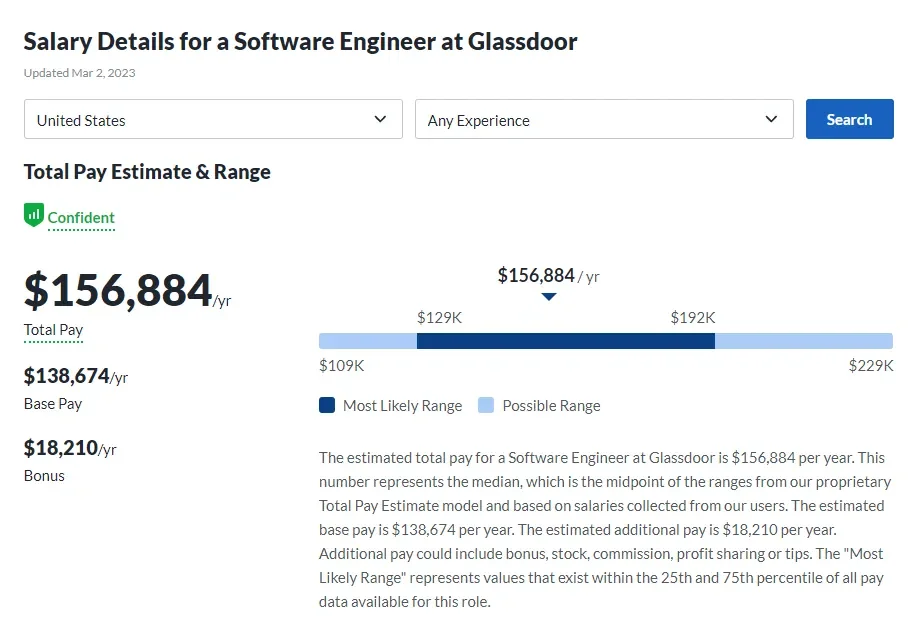
The salary of a software engineer can vary depending on several factors such as experience, location, industry, and company size.
In the United States, the average salary for a software engineer is around $156,884/year. However, this can range from around $109,000 to over $229,000/year depending on the above factors. Keep in mind that these numbers are just averages and the specific salary of a software engineer may vary.
Software engineers are entitled to a variety of benefits which can include:
- Paid time off
- Stock options
- Health insurance
- Performance bonuses
- Flexible work arrangements
- Employee assistance programs (EAPs)
- 401(k) plans or other retirement savings plans
Now that we are familiar with the details of a software engineer, let’s examine the broader scope of work for software developers.
2. What Is A Software Developer - A Detailed Overview
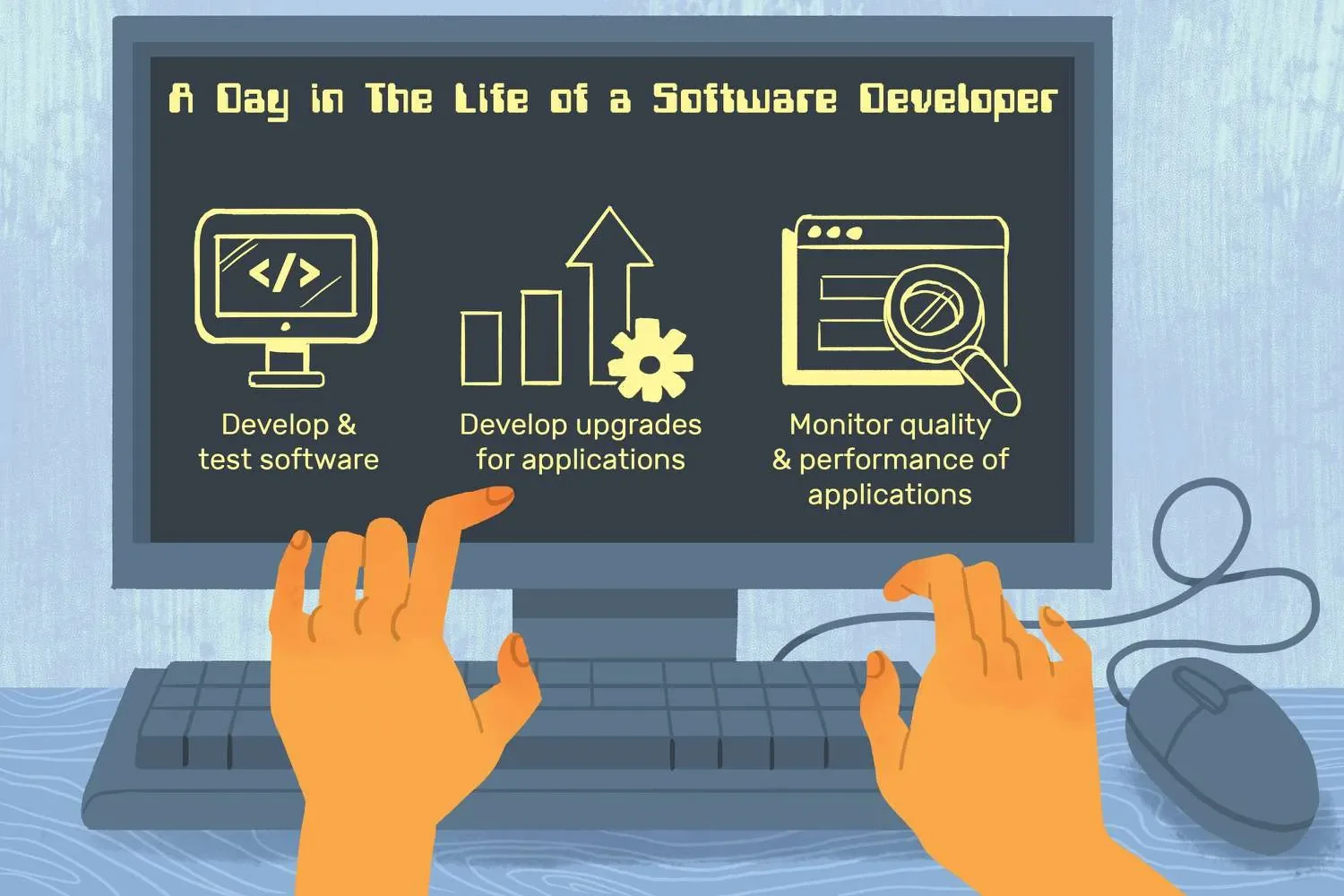
Software developers are the programming professionals responsible for building and maintaining mobile and computer software that runs on a wide variety of devices – ranging from smartphones to laptops to servers.
The software project-building process involves several stages, including:
- Planning
- Analysis
- Design
- Coding
- Testing
- Deployment
Software developers are responsible for almost all these steps. The primary goal of a software developer is to write code that is efficient, reliable, and easy to maintain and they must ensure that the software works as expected and meets the needs of users.
2.1 Required Educational Qualifications For A Software Developer
One of the most common educational qualifications for a software developer is a bachelor's degree in computer science. This type of degree program typically takes 4 years to complete and covers a broad range of topics, including:
- Algorithms
- Data structures
- Software engineering
- Computer organization
- Programming languages
In addition to a bachelor's degree, some software developers also choose to pursue a master's degree in computer science or a related field. This type of degree program is usually more focused and can help you specialize in a particular area of software development. For those looking to move into leadership or strategic roles in tech companies, an MBA can open doors to MBA jobs in product management, tech consulting, or executive positions that blend business acumen with technical expertise.
Similar to software engineers, a degree in computer science can be advantageous in becoming a software developer but it's not always necessary. Many software developers have degrees in other fields or no degree at all. Instead, they may have completed coding boot camps, taken online courses, or taught themselves how to code through practice and experimentation.
So when it comes to hiring a software developer for your company, there are many talented and capable developers without a degree who can bring value to a company. Consider the candidate's skills, experience, and work ethic, rather than solely focusing on their educational background.
2.2 Required Skills For A Software Developer
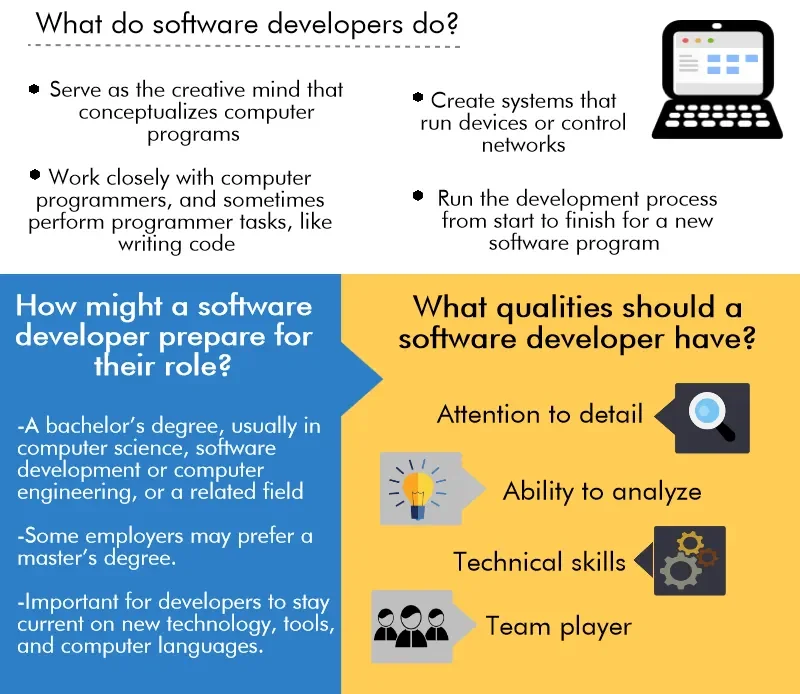
Let’s now discuss some important skills that you should consider when hiring a software developer:
2.2.1 Understanding of Software Development Life Cycle
A fundamental skill for software developers is an understanding of the software development lifecycle (SDLC). Knowing the various stages of the SDLC, such as requirements gathering, design, development, testing, and maintenance, is essential for developers to create high-quality software applications. Additionally, incorporating Secure Coding Best Practices throughout the SDLC is critical for ensuring that security vulnerabilities are minimized and that the software remains resilient against potential threats.
2.2.2 Expertise In Programming Languages
Software developers must be proficient in at least one programming language. Most in-demand languages include Java, Python, C++, JavaScript, and Ruby on Rails. Developers must understand the syntax, semantics, and structures of these languages to write efficient, error-free code.
2.2.3 Database Management
Database management is a crucial skill for software developers. Developers must have an understanding of database concepts, including schema design, normalization, indexing, and querying. Knowledge of relational databases is essential for storing and retrieving data effectively.
2.2.4 Cloud Computing
Cloud computing is an increasingly crucial skill for software developers. Developers should have an understanding of cloud computing concepts, including Infrastructure as a Service (IaaS), Platform as a Service (PaaS), and Software as a Service (SaaS). Knowledge of cloud computing platforms is essential for deploying and managing software applications in the cloud.
2.2.5 Strong Problem-Solving Skills
The primary responsibility of a software developer is to solve problems. They must have a strong analytical mind and be able to identify the root cause of any issue. They should also be able to develop effective solutions that meet the needs of the customers.
2.3 Typical Job Roles Of A Software Developer
Some of the most prominent job roles of a software developer include:
2.3.1 Front-End Developer
Front-end developers focus on creating the user interface and user experience of software applications. They use programming languages such as HTML, CSS, and JavaScript to build the front-end of websites, web applications, and mobile apps. Front-end developers also work closely with designers to ensure that the user interface is visually appealing and intuitive to use.
2.3.2 Back-End Developer
Back-end developers create the server-side logic that powers software applications. They use programming languages such as Python, Ruby, and PHP to build the back-end of the software apps. Back-end developers also work closely with database administrators to ensure that the software they develop can store and retrieve data efficiently.
2.3.3 Full-Stack Developer
A full-stack developer is a software developer who can work on both the front-end and back-end of a web or mobile application. They are skilled in multiple programming languages and frameworks and can handle a range of tasks from database management to user interface design.
2.3.4 Project Manager
Project managers oversee the development of software applications from start to finish. They work with software developers, quality assurance specialists, and other professionals to ensure that the software they develop meets the highest standards and is completed on time.
2.3.5 Technical Lead
Technical leads are responsible for the technical direction of software development projects. They work with software developers and other professionals to ensure that the software they develop meets the needs of their clients or organizations. Technical leads also mentor junior developers and guide them on technical issues.
2.4 Projects That Are Best Suited For Software Developers
Here are a few projects that are best suited for software developers:
- Web development
- Game development
- Database management
- Mobile app development
- eCommerce development
- Video game engine development
- Enterprise software development
- Geographic Information System (GIS) development
Of course, this list is by no means exhaustive - there are countless other types of projects that software developers can tackle. But if you're looking for a good place to start, these are some of the most popular and in-demand areas of software development.
When you're hiring a software developer, it's also important to consider their experience level. A junior developer may be a great fit for a smaller project while a more experienced developer may be better suited for a larger and more complex project.
2.5 Compensation & Benefits Of A Software Developer
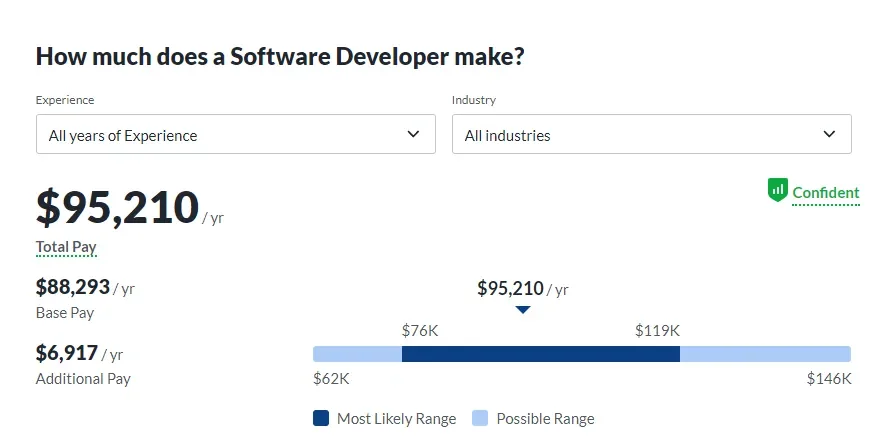
Software developers are typically well-compensated for their work, with salaries that often start at around $62,000/year for entry-level positions and can reach well over $146,000 for senior roles in high-cost-of-living areas like San Francisco or New York City. However, the average salary of a software developer is $95,210/annum.
In addition to compensation, benefits are also an important consideration for software developers. Here are a few benefits that are commonly offered:
- Paid time off
- Parental leave
- Health insurance
- Professional development
- Employee assistance programs
- Retirement savings plans such as 401(k)s
Now that we know the differences between a software engineer and a software developer, let’s discuss how you can select the right individual for your business.
Software Engineer Vs. Developer - Which Role Is Best Suited For Your Project Needs
It can be confusing to decide between a software developer vs. software engineer when it comes to hiring them because the terms are often used interchangeably and their roles can overlap to some extent. Additionally, the needs of each project can vary and it may not always be clear which role is the best fit.
Here are some key aspects that will help you decide which role is best suited for your project.
I. Analyze Your Software Needs
The first step in determining whether you need a software engineer or a developer is to analyze your software needs. What are you trying to achieve with your software project? Are you building a simple mobile app or a complex enterprise-level software solution? The very nature of your project will help you determine which role is best suited to your needs.
A software engineer typically has a higher level of education and specializes in the design and development of large-scale, complex systems. On the other hand, a developer is typically skilled in a specific programming language or framework and is adept at building applications, websites, and other solutions.
II. Determine Your Project Scope & Complexity
The next step is to determine the scope and complexity of your project. If you are building a simple app, a developer may be all you need. However, if you are building a complex system with multiple components and integrations, a software engineer will be required to ensure that everything is designed and built to work together seamlessly.
III. Evaluate Your Available Resources
Once you have analyzed your software needs and project scope, the next step is to evaluate your available resources. If you have the budget and resources, a software engineer may be the best choice for your project. However, if you are working with limited resources, a developer is the way to go.
IV. Consider Your Goals & Objectives
Your business goals and objectives will also play a role in determining whether you need a software engineer or a developer. If you are building something new, a software engineer can help you design a scalable, efficient system that meets your specific requirements. If you are improving an existing system, a developer can help you implement new features and functionality.
Conclusion
Deciding between a software engineer vs. developer can be tricky since they both have unique skill sets and approaches to software development. Picking the wrong one could spell disaster for your project, leaving you with software that doesn't fit your business needs, is hard to maintain or scale, or is riddled with quality issues.
Choose the right professional for the job to avoid any unnecessary headaches down the road. And nobody understands this better than us at Aloa. We know that picking between a software engineer and a developer can be confusing but our team understands the differences and can help you choose the right one for your project.
And we don't just leave you to it. We keep a watchful eye on the project to make sure we assign the right resources at the right time to ensure a successful outcome. With Aloa by your side, you can trust that your software engineering and development needs are in good hands.
Get in touch with us today and see how our expert team can transform your project.

